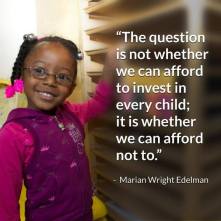 Americans have many values that we hold dearly. As shared in Real Family Values: Child Care and Early Childhood Education, “Americans hold few values dearer than equality, fairness, and opportunity, and high-quality early education is a key tool that helps level the playing field for children from low-income families. Access to high-quality child care and early childhood education has been shown to set children on a path to success, and it is one of the most important tools we have to break the cycle of poverty that exacerbates inequality in the United States. Early learning is also known to prepare children for school, but studies of Head Start participants have also shown that children who receive quality childhood education are healthier, stay in school longer, and earn more in their futures.”
Americans have many values that we hold dearly. As shared in Real Family Values: Child Care and Early Childhood Education, “Americans hold few values dearer than equality, fairness, and opportunity, and high-quality early education is a key tool that helps level the playing field for children from low-income families. Access to high-quality child care and early childhood education has been shown to set children on a path to success, and it is one of the most important tools we have to break the cycle of poverty that exacerbates inequality in the United States. Early learning is also known to prepare children for school, but studies of Head Start participants have also shown that children who receive quality childhood education are healthier, stay in school longer, and earn more in their futures.”
Parent Engagement is also a key element impacting students’ performance. Statistics also show that the achievement gap actually starts before students enter kindergarten –“48 percent of children from low-income families are not ready for school by age 5, and these low-income children face a 15-month learning gap compared to their more affluent peers.” Unfortunately, many families have work demands and other challenges that prevent each child from receiving the early support needed. Schools must recognize the importance of meeting children where they are so early high quality child care must be provided for all children who might not receive it otherwise.
The Child CARE Act, introduced by Rep. Donna Edwards and the Right Start Child Care and Education Act of 2013, introduced by Rep. Albert Ruppersberger (both of Maryland) and Sen. Barbara Boxer (CA), sought to amend the federal Child and Dependent Care Tax Credit by allowing more families access to it. This would particularly help low-income families cover the cost of child care. Legislation such as the Strong Start for America’s Children Act requires investments in our future. The Children’s Defense Fund explains “The Strong Start for America’s Children Act (S. 1697/H.R. 3461) invests in and encourages expansions of high quality home visiting programs, Early Head Start, Head Start, child care, pre-kindergarten and quality kindergarten programs to provide high quality early childhood development and learning experiences for low-income and vulnerable children from birth through age 5.” This act also promotes family support and parent engagement and assess with parents, community members and organizations a coordinated system to facilitate referrals and provision of services related to health, nutrition, mental health, disabilities and family support for children enrolled. Read a short summary here. You can also see child care status by state here.
For example, in our state, here is an excerpt of just some of the information provided. Even though Kentucky has some excellent schools, as you can see where less than 1/5 of 3 year olds and less than 1/2 of 4 year olds are in Head Start; much more than half of our students are not doing math or reading at grade level in 4th and 8th grades.
Child Hunger in Kentucky:
- Number of children who receive SNAP (food stamps) 318,000;
- Percent of eligible persons who receive SNAP (food stamps) 85%
- Number of children in the School Lunch Program 549,534
- Number of children in the Summer Food Service Program 33,091
- Number of women and children receiving WIC (Supplemental Nutrition Program for Women, Infants, and Children) 132,698.
Early Childhood Development in Kentucky:
- Percent of children under age 6 with all parents in the labor force 64.3%
- Number of children served by Head Start 20,687
- Average monthly number of children served by the Child Care Development Fund/CCDBG 30,900
- Average annual cost of child care for a four-year-old in a center $5,766
- Percent of 3-year-olds enrolled in state pre-k, Head Start, or special education programs 17.2%
- Percent of 4-year-olds enrolled in state pre-k, Head Start, or special education programs 47.8%.
Education in Kentucky:
- Annual expenditure per public school pupil $8,957
- Percent of public school fourth graders: unable to read at grade level 64.5% unable to do math at grade level 61.2%
- Percent of public school eighth graders: unable to read at grade level 63.7% unable to do math at grade level 69.3%
- Number (percentage) of 16- to 19-year-olds who are not enrolled in school and have not graduated from high school 10,241 (4.3%).
The trends in our country are clear that lower- income families have less resources and often receive the least amount of support for the challenges they face. America is among the richest countries, yet students should not have to be financially rich to receive a rich education. We must invest early in education and high quality child care and reduce the cost we pay in the end due to under-educated students, higher dropouts which lead to costly incarcerations and lost work force. All opportunities are not fair and equal, but Fair and Equal access to high quality learning opportunities should be everyone’s goal to insure our students are career and college ready and beyond.
